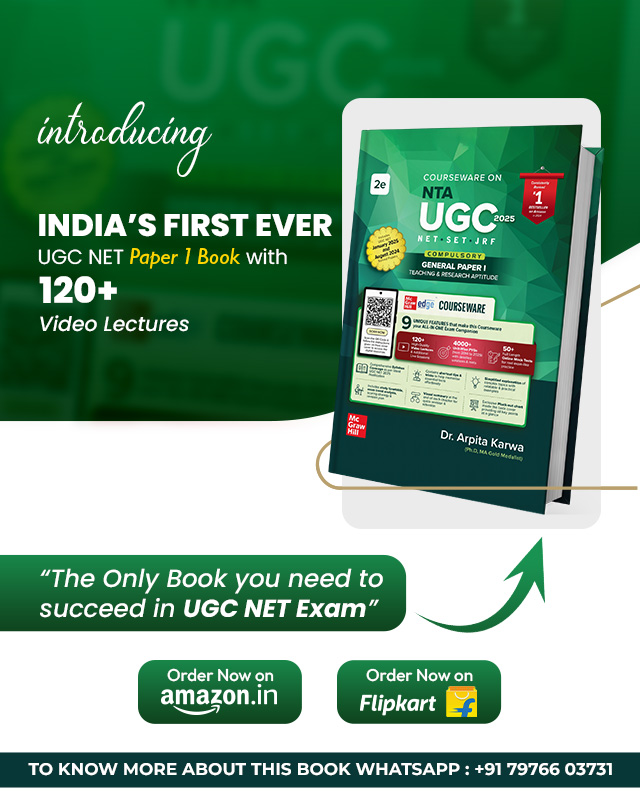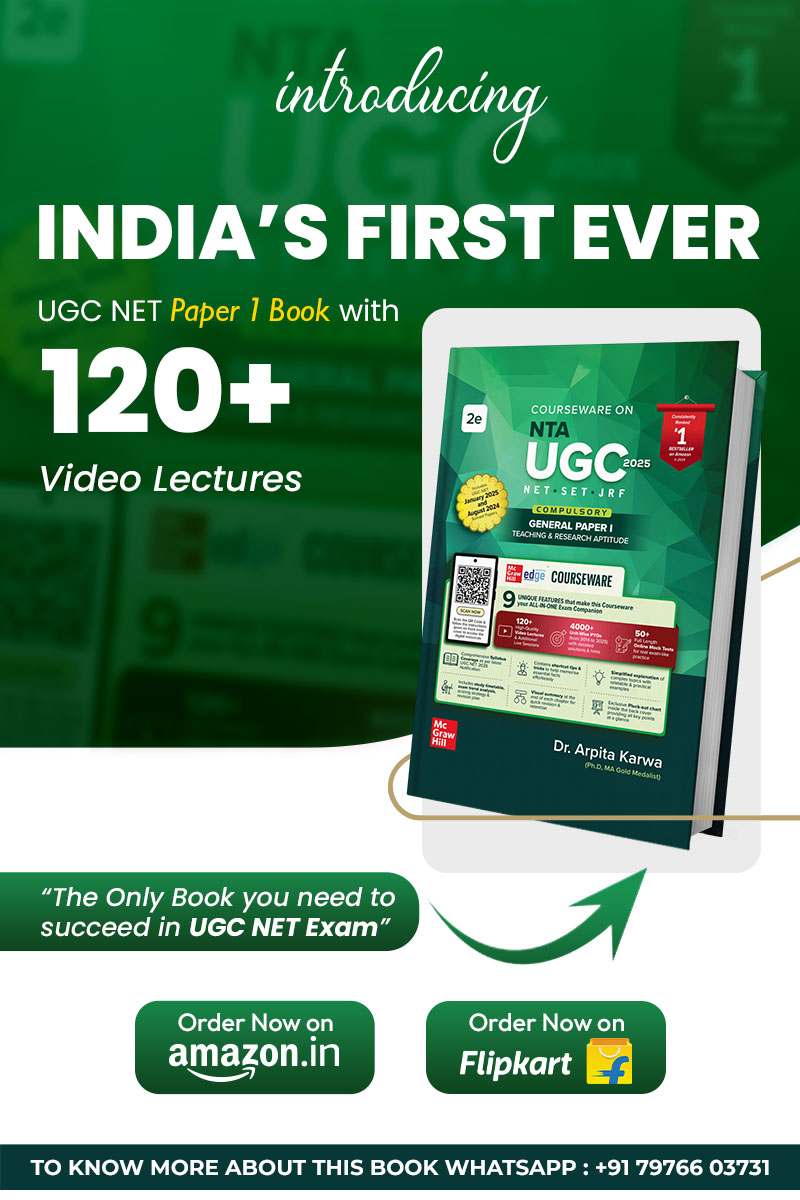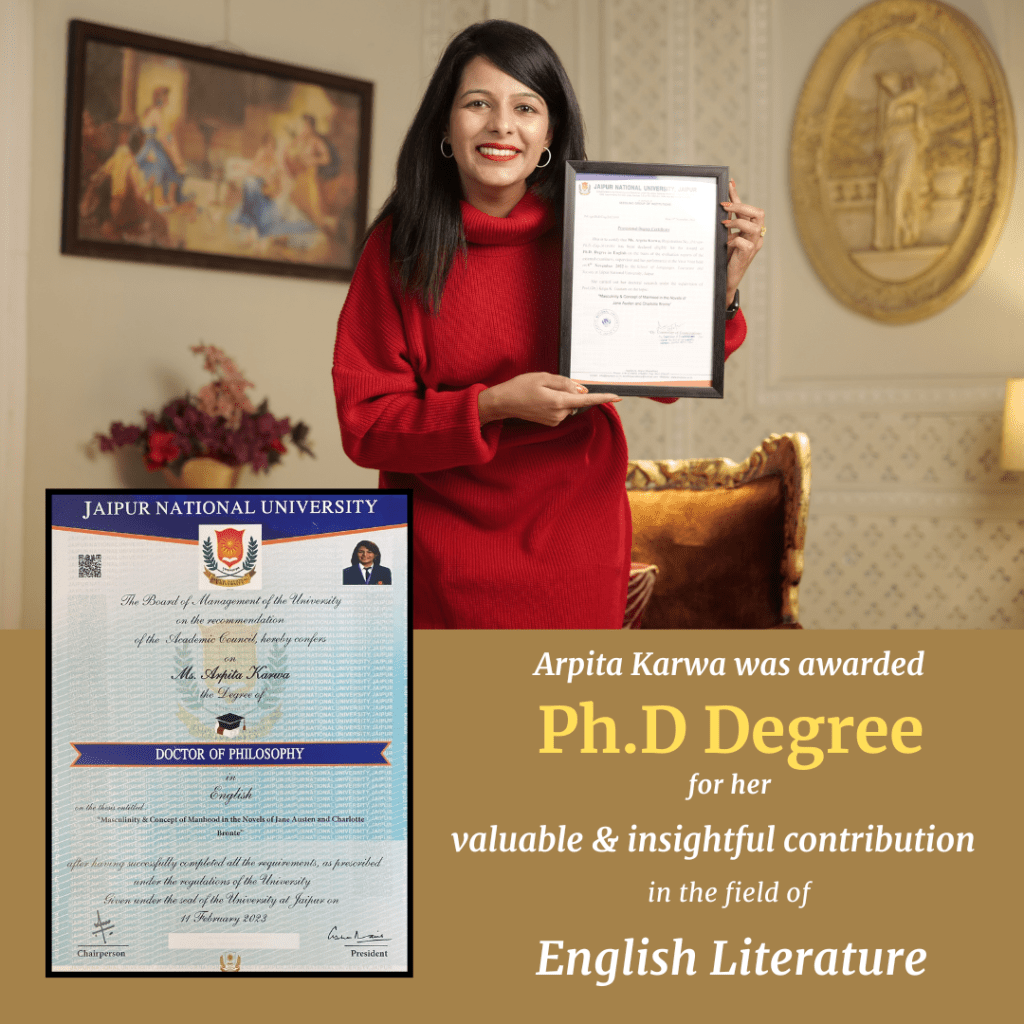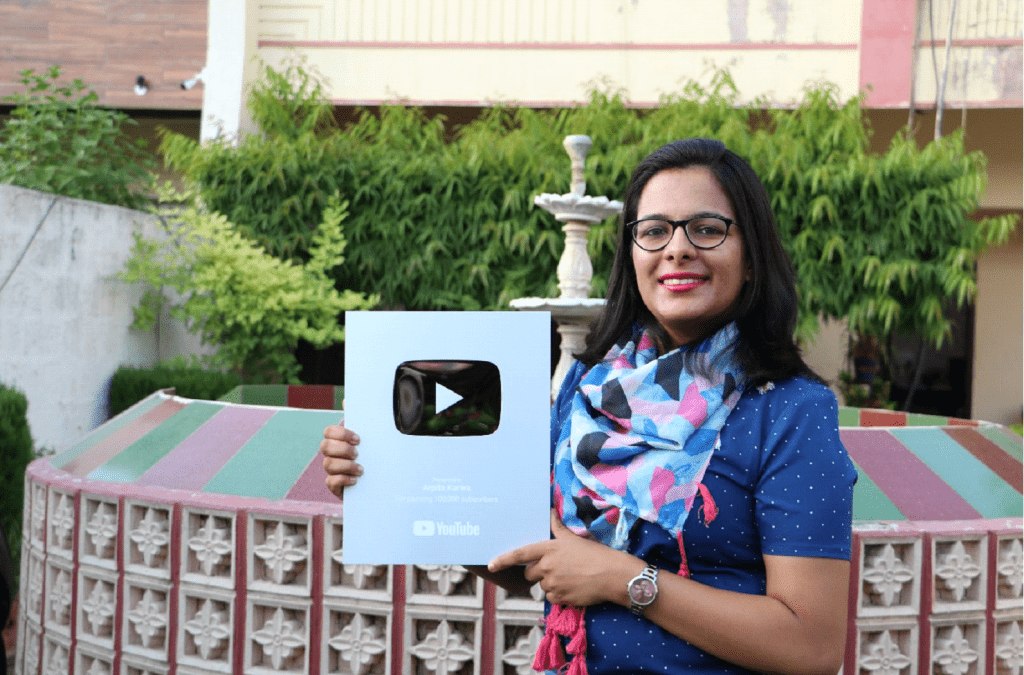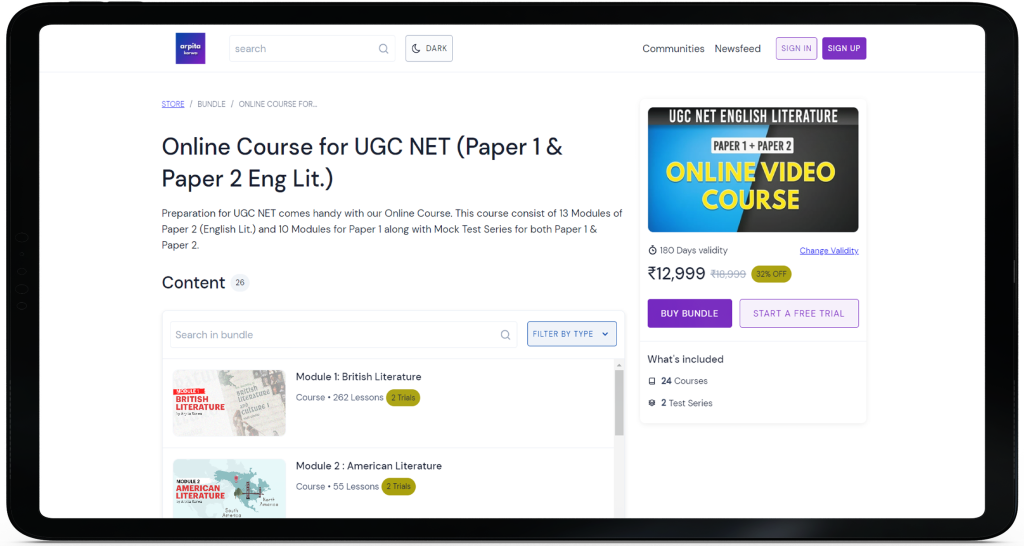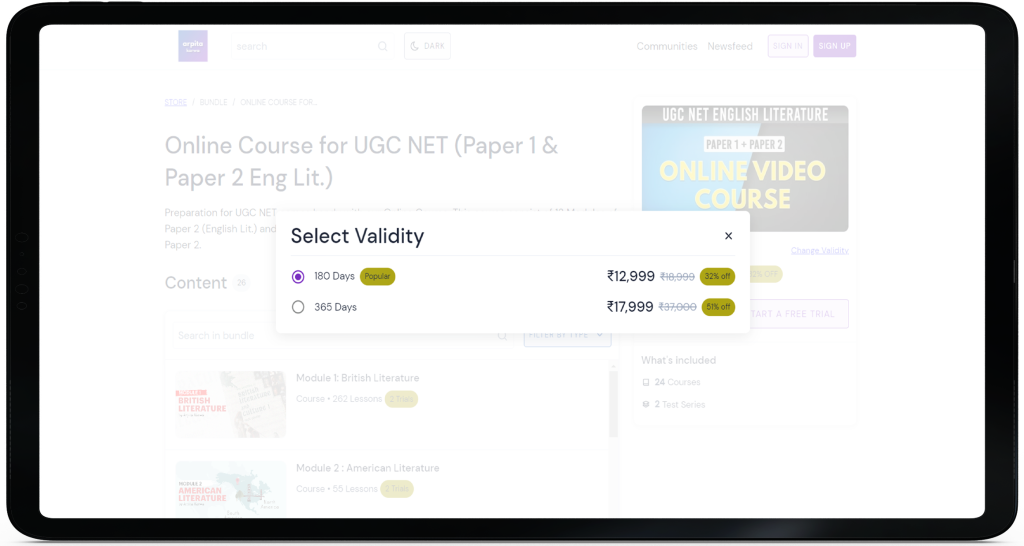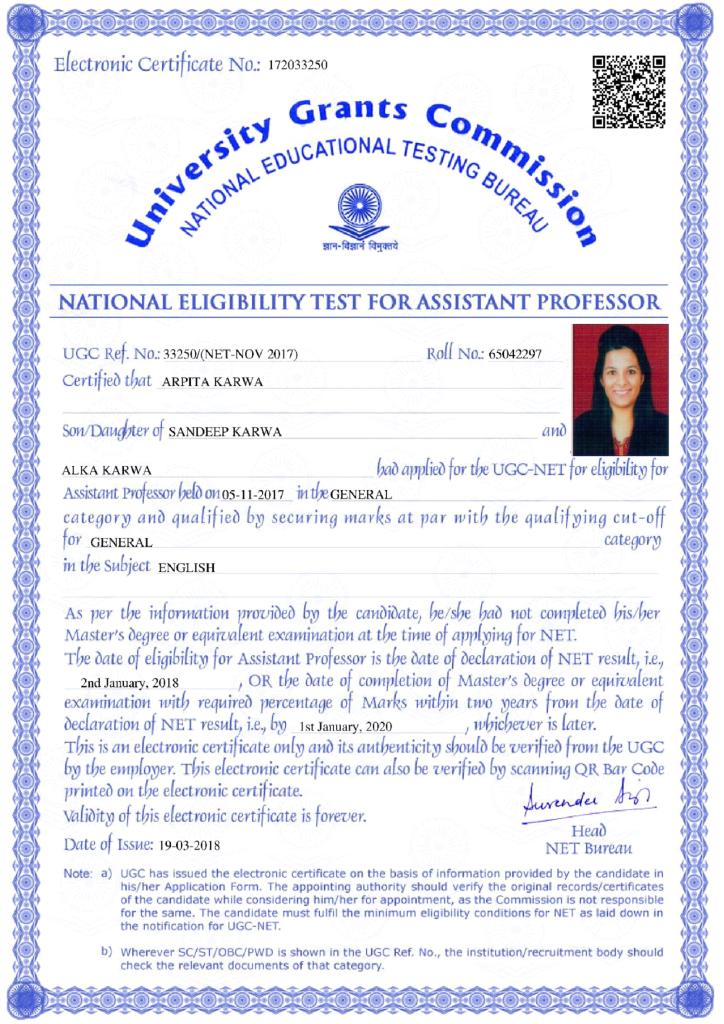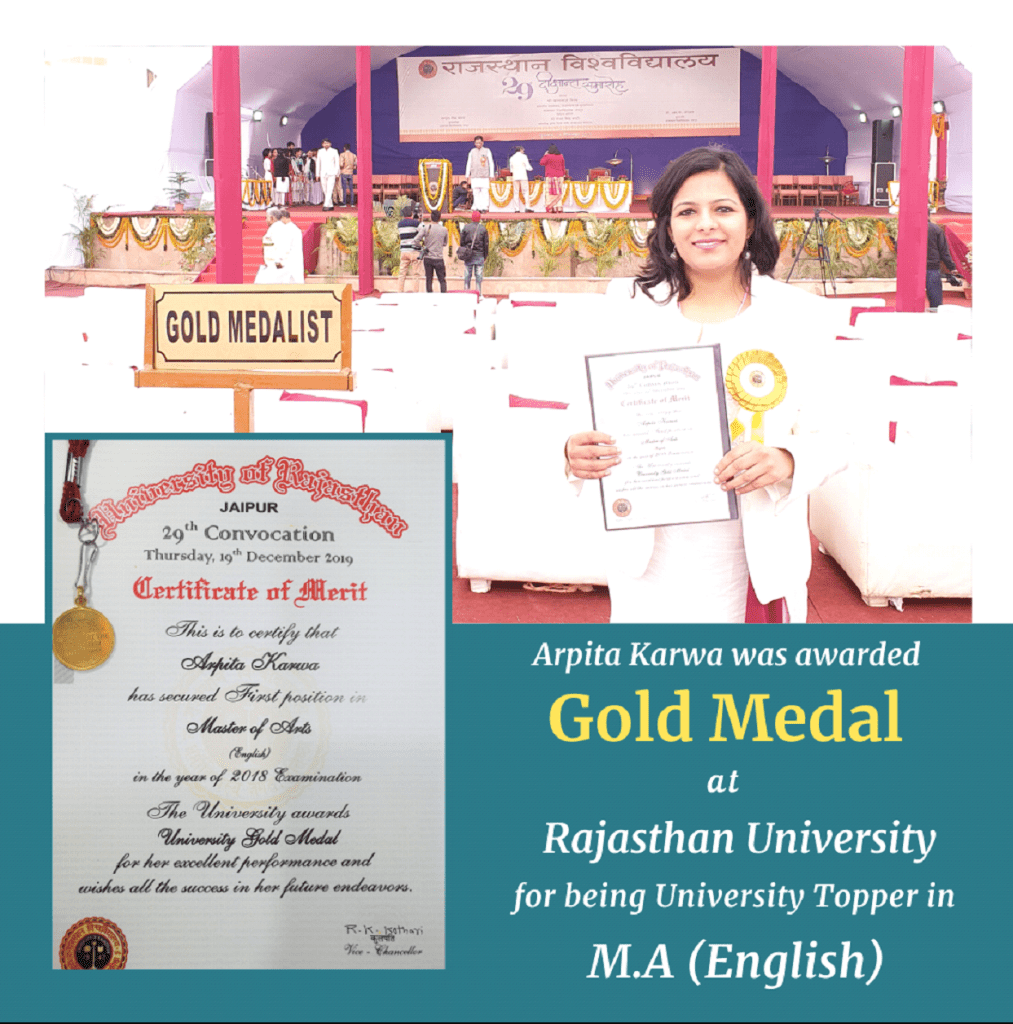March 2023 : Paper 2 (Conduced on 1st March 2023 Evening Shift)
June 19, 2023 2023-12-12 19:15March 2023 : Paper 2 (Conduced on 1st March 2023 Evening Shift)
March 2023 : Paper 2 (Conduced on 1st March 2023 Evening Shift)
Paper 2 – English Literature
Q.1) “What needs my Shakespeare for his honoured bones
The labour of an age in piled stones?
Or that his hallowed Reliques should be hid
Under a star-ypointing pyramid?”
These lines are written by
1) Ben Jonson
2) John Milton
3) Robert Browning
4) William Wordsworth
Answer: 2) John Milton
Q.2) Who among the following praised Chaucer’s translation of Roman de la rose?
1) Eustache Deschamps
2) Boccaccio
3) Jean de Meun
4) Guillaume de Lorris
Answer: 1) Eustache Deschamps
Q.3) For The Unfallen is a book of poems written by
1) Ted Hughes
2) Sylvia Plath
3) Geoffrey Hill
4) A. E. Housman
Answer: 3) Geoffrey Hill
Q.4) “The Princess: A Medley” by Tennyson is
1) A Lyric
2) An Elegy
3) A Narrative Poem
4) A Dramatic Monologue
Answer: 3) A Narrative Poem
Q.5) Which of the following works is NOT written by P.
B) Shelley?
1) The Mask of Anarchy
2) Queen Mab: A Philosophical Poem
3) The Vision of Judgement
4) The Revolt of Islam
Answer: 3) The Vision of Judgement
Q.6) In whose poem the readers meet Aunt Jennifer’s tigers?
1) Thom Gunn
2) Kamau Brathwaite
3) Roy Fisher
4) Adrienne Rich
Answer: 4) Adrienne Rich
Q.7) Name the playwright who has written Larins Sahib.
1) Gieve Patel
2) Dina Mehta
3) Gurcharan Das
4) Pratap Sharma
Answer: 3) Gurcharan Das
Q.8) Who among the following has composed the lyrical drama Hellas?
1) Lord Byron
2) P. B Shelley
3) William Wordsworth
4) John Keats
Answer: 2) P. B Shelley
Q.9) Name the playwright who composed the play A Woman Killed with Kindness.
1) Francis Beaumont
2) Beaumont and Fletcher
3) Thomas Kyd
4) Thomas Heywood
Answer: 4) Thomas Heywood
Q.10) Name the celebrated actor who played the leading role in the first production of John Osborne’s The Entertainer (1957).
1) Peter Brook
2) Laurence Olivier
3) Al Pacino
4) Robert De Niro
Answer: 2) Laurence Olivier
Q.11) Which of the following statements holds true in regard to “Sentimental Comedy”?
1) It is a dramatic composition which satirises the manners and affectations of a class.
2) It is a dramatic composition that focuses on characters, each of them representing a type personality.
3) It is a dramatic composition that depicts how seriously young people take love, and how foolishly it makes them behave.
4) It is a species of dramatic composition in which the virtues of private life are exhibited, rather than the vices exposed; and the distresses rather than the faults of mankind make our interest in the piece.
Answer: 4) It is a species of dramatic composition in which the virtues of private life are exhibited, rather than the vices exposed; and the distresses rather than the faults of mankind make our interest in the piece.
Q.12) “I recognize that its heroine is a little prig and its hero a pompous ass, but I do not care.” About which novel of Jane Austen is this statement made by Somerset Maugham?
1) Pride and Prejudice
2) Northanger Abbey
3) Sense and Sensibility
4) Mansfield Park
Answer: 4) Mansfield Park
Q.13) In which year was R. L. Stevenson’s Treasure Island published?
1) 1893
2) 1886
3) 1883
4) 1896
Answer: 3) 1883
Q.14) Which of the following novels is NOT written by Amitav Ghosh?
1) Sea of Poppies
2) Flood of Fire
3) Gun Island
4) English, August
Answer: 4) English, August
Q.15) Which among the following is NOT an American Slave narrative?
1) The Interesting Narrative of the Life of Olaudah Equiano
2) Life and Adventure of Henry Bibb
3) Narrative of Solomon Northup
4) Songs of Enchantment
Answer: 4) Songs of Enchantment
Q.16) Who among the following theorists has written on affective economies?
1) Franco Moretti
2) Bruno Latour
3) Sara Ahmed
4) Nigel Thrift
Answer: 3) Sara Ahmed
Q.17) Who among the following is NOT a Yale critic?
1) Geoffrey Hartman.
2) Paul de Man
3) J. Hillis Miller
4) Roland Barthes
Answer: 4) Roland Barthes
Q.18) ‘Demythologizing’ is a term associated with the works of
1) Claude Lévi Strauss
2) Ferdinand de Saussure
3) Rudolph Bultmann
4) Friedrich Schleiermacher
Answer: 3) Rudolph Bultmann
Q.19) Who among the following is known as a post-Marxist thinker?
1) Ernest Laclau
2) Antonio Gramsci
3) Theodor Adorno
4) Walter Benjamin
Answer: 1) Ernest Laclau
Q.20) Jonathan Bate’s The Song of the Earth was published in
1)2001
2) 1991
3) 2000
4) 1999
Answer: 3) 2000
Q.21) Who among the following is NOT a member of the Frankfurt School?
1) Louis Althusser
2) Max Horkheimer
3) Theodor Adorno
4) Herbert Marcuse
Answer: 1) Louis Althusser
Q.22) Which of the following methods is the oldest for teaching English language?
1) The Bilingual Method
2) The Grammar Translation Method
3) The Direct Method
4) The Situation Method
Answer: 2) The Grammar Translation Method
Q.23) In the area of theory and research known as Second Language Acquisition (SLA), the classroom is considered
1) An Ideal Model For Research.
2) A Site Of No Use.
3) A Site That Always Produces Language Learning Blockade.
4) An Experimental Laboratory.
Answer: 4) An Experimental Laboratory.
Q.24) The arrival of corpus linguistics has revitalized
1) The Writing Of Observation-Based Grammar.
2) The Writing That Does Not Care For Grammar.
3) The Use Of Long Sentences In Newspaper Reporting.
4) The Quality Of Newspaper Reporting.
Answer: 1) The Writing Of Observation-Based Grammar.
Q.25) Which of the following is one of the DON’TS of writing a dissertation or thesis:
1) Compiling a bibliography as soon as the work is started.
2) Avoid jargon wherever possible.
3) It should be kept in mind that a dissertation or a thesis should take the form of an argument in which the writer must attempt to convince the reader of his or her case.
4) A researcher should not bother about the use of the proper scholarly conventions from the very beginning.
Answer: 4) A researcher should not bother about the use of the proper scholarly conventions from the very beginning.
Q.26) In which year, did the ‘Indian Education Commission’ (The sixth commission in the history of Indian Education) under the chairmanship of Dr. D S. Kothari submit its report?
1) 1956
2) 1966
3) 1976
4) 1986
Answer: 2) 1966
Q.27) Who was the Chairman of the University Education Commission of 1948?
1) Babu Rajendra Prasad
2) D S. Kothari
3) Maulana Abul Kalam Azad
4) S. Radhakrishnan
Answer: 4) S. Radhakrishnan
Q.28) Which of the following is the first newspaper of India?
1) Hicky’s Bengal Gazette
2) Jhones’ Calcutta Gazette
3) William’s Indian Gazette
4) Salisbury’s Madras Gazette
Answer: 1) Hicky’s Bengal Gazette
Q.29) “The great object of the British Government ought to be the promotion of European literature and science among the natives of India, all funds appropriated for the purpose of education would be best employed on English education alone” Who made the comment given above?
1) Lord Macaulay
2) Sir Charles Wood
3) Lord William Bentinck
4) Arthur Mayhew
Answer: 3) Lord William Bentinck
Q.30) Todd Kachru in “Three Circles of English” observes that English speaking countries are separated into three groups.
Choose the correct answer from the options given below:
1) Central Circle, Middle Circle and Peripheral Circle
2) Primary Circle, Secondary Circle and Tertiary Circle
3) Inner Circle, Outer Circle and Expanding Circle
4) Inner Circle, Middle Circle and Outer Circle
Answer: 3) Inner Circle, Outer Circle and Expanding Circle
Q.31) Which one of the following is false about V. S. Naipaul?
1) He was awarded the Nobel Prize in Literature in 2001
2) He won the Booker Prize for his novel A House for Mr. Biswas.
3) He contributed his stories to the Trinidad Guardian.
4) He won the Somerset Maugham Award for his Miguel Street.
Answer: 2) He won the Booker Prize for his novel A House for Mr. Biswas.
Q.32) Which one of the following is false?
1) An ideal literary researcher must be an insatiable reader.
2) An ideal literary researcher should not cast himself back into another age
3) An ideal literary researcher should comprehend the current attitudes or the artistic assumptions.
4) An ideal literary researcher must have a vivid sense of history.
Answer: 2) An ideal literary researcher should not cast himself back into another age
Q.33) Which of the following is true in the context of New Criticism?
1) It follows the tradition of Historical Criticism.
2) The main law of New Criticism is that it should be subjective analysis.
3) The distinctive procedure for a New Critic is explication.
4) The distinction between literary genres does play an essential role in New Criticism.
Answer: 3) The distinctive procedure for a New Critic is explication.
Q.34) The pamphlet The Power of Love (1643) proclaiming the importance of brotherhood as a means of achieving a radical change in social relationships was written by.
1) George Saintsbury
2) William Walwyn
3) F R. Leavis
4) Gerrard Winstanley
Answer: 2) William Walwyn
Q.35) Francis Bacon’s The Advancement of Learning attempted to draw a distinction between two kinds of ‘truth’. Which are these?
1) Theological Truth and Scientific Truth
2) Theological Truth and Aesthetic Truth
3) Aesthetic Truth and Objective Truth
4) Metaphysical Truth and Aesthetic Truth.
Answer: 1) Theological Truth and Scientific Truth
Q.36) “I shall be ambitious to have it said of me, that I have brought Philosophy out of Closets and Libraries, Schools and Colleges, to dwell in Clubs and Assemblies, at Tea-Tables, and in Coffee- Houses.”
To whom do you attribute this famous statement?
1) Dr Samuel Johnson
2) Joseph Addison
3) Charles Lamb
4) Alexander Pope
Answer: 2) Joseph Addison
Q.37) Dr Johnson’s Dictionary of the English Language was published in
1) 1751
2) 1753
3) 1755
4) 1757
Answer: 3) 1755
Q.38) An Essay on the Principles of Human Action was written by
1) Charles Lamb
2) Jean Jacques Rousseau
3) William Godwin
4) William Hazlitt
Answer: 4) William Hazlitt
Q.39) Which of the following is false about Frederick Douglass?
1) Douglass’s autobiography belongs to the tradition of fugitive-slave narrative popular in the North before the Civil War.
2) He provides a first-person account of his life spent in slavery.
3) He was famous as an orator, dedicated to a black liberation movement.
4) He wrote Up From Slavery.
Answer: 4) He wrote Up From Slavery.
Q.40) The phrase “structure of feeling” is attributed to
1) Lauren Berlant
2) Terry Eagleton
3) Raymond Williams
4) Eve Kosofsky Sedgwick
Answer: 3) Raymond Williams
Q.41) “A Valediction Forbidding Mourning” is written by
A) John Donne
B) John Milton
C) Adrienne Rich
D) Sylvia Plath
E) Robert Frost
Choose the correct answer from the options given below:
1) A and C only.
2) A and B only.
3) D and E only.
4) B and C only.
Answer: 1) A and C only.
Q.42) Which of the following two poems are linked with each other in terms of form?
A) “The Last Ride Together”
B) “Ulysses”
C) “Upon Appleton House: To My Lord Fairfax”
D) “To Penshurst”
E) “The Waste Land”
Choose the correct answer from the options given below:
1) A and E only.
2) A and B only.
3) A and D only.
4) C and D only.
Answer: 4) C and D only.
Q.43) Which of the following poems are written by Alexander Pope?
A) The Dunciad
B) Moral Essays
C) Grongar Hill
D) Cooper’s Hill
E) Absalom and Achitophel
Choose the correct answer from the options given below:
1) A and C only.
2) B and E only.
3) A and B only.
4) C and D only.
Answer: 3) A and B only.
Q.44) Identify the plays originally written by Vijay Tendulkar from the following:
A) The Cyclist and His Fifth Woman
B) Scandal in Fairyland
C) The Vultures and Encounter in Umbugland
D) Sakharam Binder
E) Fire and the Rain
Choose the correct answer from the options given below:
1) B, C and E only.
2) A, B and C only.
3) A, C and D only.
4) A, B and D only.
Answer: 3) A, C and D only.
Q.45) Identify the plays written by Asif Currimbhoy from the following:
A) Princes
B) The Captives
C) An Experiment with Truth.
D) Angkor
E) Dance Like a Man
Choose the correct answer from the options given below:
1) A, B and D only.
2) B, C and D only.
3) A, B and C only.
4) A, B and E only.
Answer: 2) B, C and D only.
Q.46) Which of the following are the plays written by Robert Greene?
A) The Famous Chronicle of King Edward the First
B) Alphonsus
C) A Moon for the Misbegotten
D) The Old Wives’ Tale
E) King of Aragon
Choose the correct answer from the options given below:
1) B and D only.
2) A and E only.
3) B and E only.
4) C and E only.
Answer: 3) B and E only.
Q.47) Which of the following two plays were written by W. B Yeats?
A) The Land of Heart’s Desire
B) Time and the Conways
C) The Silver Tassie
D) The Countess Cathleen
E) The Plough and the Stars
Choose the correct answer from the options given below:
1) C and D only.
2) A and D only.
3) A and E only.
4) B and E only.
Answer: 2) A and D only.
Q.48) Which among the following are true in the context of Chinua Achebe?
A) He wrote Arrow of God and Things Fall Apart.
B) His “Novelist as Teacher” is a seminal essay in the context of African Literature
C) The name of the tribe he depicted in Things Fall Apart is Igbo
D) He is a Kenyan born American litterateur.
E) He wrote the essay “An Abolition of English Department.”
Choose the correct answer from the options given below:
1) A, C and D only.
2) A, B and E only.
3) A, B and C only.
4) B, C and D only.
Answer: 3) A, B and C only.
Q.49) Identify the correct ones among the following:
A) The Apologie for Poetrie was written by Sir Philip Sidney.
B) Sir Philip Sidney wrote the Apologie for Poetrie as a counterblast to Stephen Gosson’s The School of Abuse
C) Stephen Gosson wrote The School of Abuse in the euphuistic style
D) Sidney’s style was characterised by neoclassical restraint.
E) Sidney and Gosson wrote their critical treatise in the eighteenth century.
Choose the correct answer from the options given below:
1) A, B and C only.
2) A, C and D only.
3) A, D and E only.
4) A, C and E only.
Answer: 1) A, B and C only.
Q.50) Which of the following works have NOT been written by Thomas Carlyle?
A) Of Heroes and Hero-Worship
B) The French Revolution
C) Of Human Bondage
D) The Hour and the Man
E) Hudibras
Choose the correct answer from the options given below:
1) A and B only.
2) A and C only.
3) A and D only.
4) A and E only.
Answer: 1) A and B only.
Q.51) Which of the following works have NOT been authored by John Stuart Mill?
A) Subjection of Women
B) Thoughts on Parliamentary Reform
C) Past and Present
D) Explorations
E) On Liberty
Choose the correct answer from the options given below:
1) A and B only.
2) A and E only.
3) C and D only.
4) B and E only.
Answer: 3) C and D only.
Q.52) Which among the following are true in the context of literary research?
A) It is devoted to the enlightenment of criticism
B) It seeks to illuminate the work of art as it really is
C) It has no connection with the proffered information
D) It tries to see the writer as s/he really was
Choose the correct answer from the options given below:
1) A, C and D only.
2) B, C and D only.
3) A, B and D only.
4) A, B and C only.
Answer: 3) A, B and D only.
Q.53) Which among the following are false in the context of autographical research?
A) These can be accepted on face value
B) These are usually idealized
C) These are coloured by compelling motive of the desire for self-justification.
D) These are embroidered through the sheer exuberance of the artistic imagination.
Choose the correct answer from the options given below:
1) A, C and D only.
2) B, C and D only.
3) A, B and D only.
4) A, B, C and D.
Answer: 2) B, C and D only.
Q.54) Which of the following are the key attributes and skills required in the context of tools and techniques for literary research?
A) Having an overview of the main online and printed sources relevant to the research.
B) Not participating in any online information networks as others may copy the work.
C) Getting to know a range of available online sources, and being able to evaluate these sources comparatively.
D) Using online and printed sources to identify and locate material archives.
E) Peer management technique
Choose the correct answer from the options given below:
1) A, B and C only.
2) B, C and E only.
3) A, C and D only.
4) A, B, C and D only.
Answer: 3) A, C and D only.
Q.55) Which among the following are written by Mikhail Bakhtin?
A) White Mythology
B) Freudianism: A Marxist Critique
C) The Ideology of the Aesthetics
D) Rabelais and His World
E) Morphology of the Folktale
Choose the correct answer from the options given below:
1) A and C only.
2) B and D only.
3) A and E only.
4) B and C only.
Answer: 2) B and D only.
Q.56) Which of the following are correctly matched?
A) John Keble – On the Healing Power of Poetry
B) Carl G. Jung – Writing and Difference
C) Jacques Derrida – Modern Man in Search of a Soul
D) Harold Bloom – The Anxiety of Influence
E) Kate Millett-Jacques Lacan: A Feminist Introduction
Choose the correct answer from the options given below:
1) B and C only.
2) A and D only.
3) A and E only.
4) B and D only.
Answer: 2) A and D only.
Q.57) Gilles Deleuze and Félix Guattari’s Anti-Oedipus: Capitalism and Schizophrenia fuses two theoretical paradigms. They are
A) Marxism
B) Poststructuralism
C) Psychoanalysis
D) Feminism
Choose the correct answer from the options given below:
1) A and C only.
2) A and B only.
3) A and D only.
4) B and C only.
Answer: 4) B and C only.
Q.58) Which of the two following books are written by Dipesh Chakrabarty?
A) Provincializing Europe: Postcolonial Thought and Historical Difference
B) The Subaltern Studies Reader
C) Identity and Violence
D) The Climate of History in a Planetary Age
E) In Other Worlds
Choose the correct answer from the options given below:
1) A and C only.
2) A and B only.
3) A and D only.
4) B and E only.
Answer: 3) A and D only.
Q.59) Which of the following two books have their roots in Foucauldian thoughts on sexuality?
A) Metahistory
B) Gender Trouble: Feminism and the Subversion of Identity
C) The Role of the Reader
D) Epistemology of the Closet
E) Sexual Politics
Choose the correct answer from the options given below:
1) B and C only.
2) A and D only.
3) A and C only.
4) B and D only.
Answer: 4) B and D only.
Q.60) Which of the following are written by George Peele?
A) The Famous Chronicle of King Edward the First
B) A Moon for the Misbegotten
C) The Arraignment of Paris
D) The Scottish Historie of James the Fourth
E) The Old Wives’ Tale
Choose the correct answer from the options given below:
1) B, C and D only.
2) A, C and E only.
3) A, C and D only.
4) C, D and E only.
Answer: 2) A, C and E only.
Q.61) Which among the following are true in the context of Gabriel García Márquez?
A) He was a Caribbean novelist, short-story writer, screenwriter, and journalist.
B) He was affectionately known as Gabo or Gabito throughout Latin America.
C) He received the Nobel Prize in Literature in 1982.
D) Love in the Time of Cholera is a Memoir written by Márquez.
E) His novel One Hundred Years of Solitude was published in 1967.
Choose the correct answer from the options given below:
1) A, C and D only.
2) B, C and D only.
3) B, C and E only.
4) A, C and E only.
Answer: 3) B, C and E only.
Q.62) Which of the following are the novels written by John Steinbeck?
A) The Naked and the Dead
B) The Grapes of Wrath
C) East of Eden
D) To Kill a Mockingbird
E) Cannery Row
Choose the correct answer from the options given below:
1) A, C and D only.
2) B, C and E only.
3) C, D and E only.
4) A, D and E only.
Answer: 2) B, C and E only.
Q.63) Which of the following are the leading characters in the novels written by Mulk Raj Anand?
A) Munoo
B) Bakha
C) Sampath
D) Gangu
E) Dopdi
Choose the correct answer from the options given below:
1) B, C and D only.
2) A, C and E only.
3) C, D and E only.
4) A, B and D only.
Answer: 4) A, B and D only.
Q.64) Identify the correct pairs:
A) Ewan McEwan – Amsterdam
B) Italo Calvino – If on a Winter’s Night A Traveller
C) Amitav Ghosh – The Circle of Reason
D) D M Thomas – Everest Hotel
E) Doris Lessing – The Testaments
Choose the correct answer from the options given below:
1) A, B and C only.
2) A, B and E only.
3) B, C and D only.
4) C, D and E only.
Answer: 1) A, B and C only.
Q.65) Identify the correct pairs:
A) Aristotle Rhetoric
B) Quintilian – Oratorical Institutions
C) C) Brooks and R. P. Warren – Understanding Fiction
D) Allen Tate – The Verbal Icon
E) Harold Bloom – The Great Tradition
Choose the correct answer from the options given below:
1) A, B and C only.
2) A, B and D only.
3) B, C and E only.
4) B, D and E only.
Answer: 1) A, B and C only.
Q.66) Match List I with List II
| LIST I (Output Device) | LIST II (Description) | |||
|---|---|---|---|---|
| A) | Rabindranath Tagore | I. | Purdah and Other Poems | |
| B) | Muhammad Iqbal | II. | The Unfinished Man | |
| C) | Nissim Ezekiel | III. | The Child | |
| D) | Imtiaz Dharker | IV. | The Secrets of the Self | |
Choose the correct answer from the options given below:
1) (A)-(III), (B)-(11), (C)-(1), (D)-(IV)
2) (A)-(IV), (B)-(1), (C)-(II), (D)-(III)
3) (A)-(III), (B)-(IV), (C)-(II), (D)-(1)
4) (A)-(III), (B)-(II), (C)-(1), (D)-(IV)
Answer: 3) (A)-(III), (B)-(IV), (C)-(II), (D)-(1)
Q.67) Match List I with List II
| LIST I (Output Device) | LIST II (Description) | |||
|---|---|---|---|---|
| A) | Emily Dickinson | I. | Woman to Man | |
| B) | Kath Walker | II. | Banking Potatoes | |
| C) | Judith Wright | III. | Because I could not stop for Death | |
| D) | Yusef Komunyakaa | IV. | We Are Going | |
Choose the correct answer from the options given below:
1) (A)-(II), (B)-(III), (C)-(I), (D)-(IV)
2) (A)-(I), (B)-(II), (C)-(III), (D)-(IV)
3) (A)-(III), (B)-(II), (C)-(I), (D)-(IV)
4) (A)-(III), (B)-(IV), (C)-(I), (D)-(II)
Answer: 4) (A)-(III), (B)-(IV), (C)-(I), (D)-(II)
Q.68) Match List I with List II
| LIST I (Output Device) | LIST II (Description) | |||
|---|---|---|---|---|
| A) | Blood | I. | Phlegmatic | |
| B) | Yellow Bile | II. | Sanguine | |
| C) | Phlegm | III. | Melancholy | |
| D) | Black Bile | IV. | Choleric | |
Choose the correct answer from the options given below:
1) A-I, B-II, C-III, D-IV
2) A-II, B-IV, C-I, D-III
3) A-IV, B- III, C-II, D-I
4) A-III, B-I, C-II, D-IV
Answer: 2) A-II, B-IV, C-I, D-III
Q.69) Match List I with List II
| LIST I (Output Device) | LIST II (Description) | |||
|---|---|---|---|---|
| A) | Some are born great, others achieve greatness. | I. | The Tempest | |
| B) | Love looks not with the eyes, but with the mind, And therefore is winged Cupid painted blind | II. | The Comedy of Errors | |
| C) | III deeds is doubled with an evil word | III. | A Midsummer Night’s Dream | |
| D) | We are such stuff as dreams are made on, and our little life is rounded with a sleep. | IV. | Twelfth Night | |
Choose the correct answer from the options given below:
1) A-IV, B-III, C-II, D-I
2) A-1, B-II, C-III, D-IV
3) A-III, B- IV, C-I, D-II
4) A-II, B-III, C-I, D-IV
Answer: 1) A-IV, B-III, C-II, D-I
Q.70) Match List I with List II
| LIST I (Output Device) | LIST II (Description) | ||
|---|---|---|---|
| A) | Aporia | I. | Marxism |
| B) | Scapes | II. | Psychoanalysis |
| C) | Interpellation | III. | Deconstruction |
| D) | Mirror Stage | IV. | Globalisation |
Choose the correct answer from the options given below:
1) (A)-(III), (B)-(II), (C)-(1), (D)-(IV)
2) (A)-(IV), (B)-(1), (C)-(II), (D)-(III)
3) (A)-(III), (B)-(IV), (C)-(1), (D)-(II)
4) (A)-(II), (B)-(III), (C)-(1), (D)-(IV)
Answer: 3) (A)-(III), (B)-(IV), (C)-(1), (D)-(II)
Q.71) Match List I with List II
| LIST I (Output Device) | LIST II (Description) | ||
|---|---|---|---|
| A) | The Political Unconscious: Narrative as a Socially Symbolic Act | I. | Joseph Carroll |
| B) | The Pleasure of the Text | II. | Monique Wittig |
| C) | The Straight Mind and Other Essays | III. | Roland Barthes |
| D) | Literary Darwinism: Evolution, Human Nature and Literature | IV. | Fredric Jameson |
Choose the correct answer from the options given below:
1) (A)-(II), (B)-(III), (C)-(I), (D)-(IV)
2) (A)-(II), (B)-(IV), (C)-(I), (D)-(III)
3) (A)-(III), (B)-(IV), (C)-(II), (D)-(I)
4) (A)-(IV), (B)-(III), (C)-(II), (D)-(I)
Answer: 4) (A)-(IV), (B)-(III), (C)-(II), (D)-(I)
Q.72) Match List I with List II
| LIST I (Output Device) | LIST II (Description) | ||
|---|---|---|---|
| A) | The Famished Road | I. | Buchi Emecheta |
| B) | The Bride Price | II. | Nadine Gordimer |
| C) | Half of a Yellow Sun | III. | Ben Okri |
| D) | The Lying Days | IV. | Chimamanda Ngozi Adichie |
Choose the correct answer from the options given below:
1) A-III, B-I, C-IV, D-II
2) A III, B-II, C-IV, D-I
3) A-IV, B-III, C-II, D-I
4) A-II, B-IV, C-I, D-III
Answer: 1) A-III, B-I, C-IV, D-II
Q.73) Match List I with List II
| LIST I (Output Device) | LIST II (Description) | ||
|---|---|---|---|
| A) | Ratanbai: A Sketch of a Bombay High Caste Hindu Young Wife | I. | Krupabai Satthianadhan |
| B) | The Hindoo Wife or The Enchanted Fruit | II. | Shevantibai M. Nikambe |
| C) | Kamala, A Story of Hindu Life | III. | Toru Dutt |
| D) | Bianca or The Young Spanish Maiden | IV. | Raj Lakshmi Debi |
Choose the correct answer from the options given below:
1) A-I, B-III, C-IV, D-II
2) A-III, B-II, C-IV, D-I
3) A-II, B-IV, C-I, D-III
4) A-IV, B-II, C-I, D-III
Answer: 3) A-II, B-IV, C-I, D-III
Q.74) Match List I with List II
| LIST I (Output Device) | LIST II (Description) | ||
|---|---|---|---|
| A) | Richard Wright | I. | A Mercy |
| B) | Toni Morrison | II. | Kindred |
| C) | Barbara Chase Riboud | III. | American Hunger |
| D) | Octavia Butler | IV. | Sally Hemings |
Choose the correct answer from the options given below:
1) A-III, B-I, C-IV, D-II
2) A III, B-II, C-IV, D-I
3) A-IV, B-III, C-II, D-I
4) A-II, B-IV, C-I, D-III
Answer: 1) A-III, B-I, C-IV, D-II
Q.75) Match List I with List II
| LIST I (Output Device) | LIST II (Description) | ||
|---|---|---|---|
| A) | M. K. Naik | I. | The Indian Contribution to English Literature |
| B) | David McCutchion | II. | A History of Indian English Literature |
| C) | A R Srinivasa Iyengar | III. | English in India: Its Present and Future | D) | V. K Gokak | IV. | Indian Writing in English: Critical Essays |
Choose the correct answer from the options given below:
1) A-I, B-II, C-IV, D-III
2) A-III, B- II, C-I, D-IV
3) A-II, B-IV, C-I, D-III
4) A-IV, B-I, C-III, D-II
Answer: 3) A-II, B-IV, C-I, D-III
Q.76)Choose the correct chronological sequence in which the following texts were published
A) The Tower
B) The Hind and the Panther
C) The Wild Swans at Coole
D) Mac Flecknoe
E) The Whitsun Weddings
Choose the correct answer from the options given below:
1) A, B, D, E, C
2) B, C, A, E, D
3) B, A, C, D, E
4) D, B, C, A, E
Answer: 4) D, B, C, A, E
Q.77) Arrange the following poets in accordance with their years of birth.
A) George Herbert
B) Edmund Spenser
C) Philip Sidney
D) John Donne
E) Oliver Goldsmith
Choose the correct answer from the options given below:
1) A, B, D, C, E
2) B, C, D, A, E
3) E, B, A, D, C
4) A, D, E, B, C
Answer: 2) B, C, D, A, E
Q.78) Find the chronological order of publication of the given works:
A) Darwin’s Origin of Species
B) Macaulay’s “Essay on Milton”
C) Stevenson’s Treasure Island
D) Browning’s “Pauline”
E) Arnold Bennet’s Old Wives Tale
Choose the correct answer from the options given below:
1) A, B, C, D, E
2) B, D, A, C, E
3) C, D, A, B, E
4) D, E, A, C, B
Answer: 2) B, D, A, C, E
Q.79) Find the chronological order of the writers in terms of their years of birth:
A) Jane Austen
B) Henry Fielding
C) James M. Barrie
D) Richard Doddridge Blackmore
E) William Makepeace Thackeray
Choose the correct answer from the options given below:
1) A, B, C, D, E
2) B, A, E, D, C
3) C, D, A, B, E
4) D, B, A, E, C
Answer: 2) B, A, E, D, C
Q.80) Find the chronological order of the writers in terms of the period they belonged to:
A) Richard Steele
B) Charles Lamb
C) John Dryden
D) Francis Bacon
E) Matthew Arnold
Choose the correct answer from the options given below:
1) A, B, C, D, E
2) B, D, E, C, A
3) C, B, D, A, E
4) D, C, A, B, E
Answer: 4) D, C, A, B, E
Q.81) Find the chronological order of publication of the given works:
A) Rajmohan’s Wife
B) A Bend in the Ganges
C) Kanthapura
D) Untouchable
E) Distant Drum
Choose the correct answer from the options given below:
1) A, B, C, D, E
2) A, C, D, E, B
3) A, D, C, B, E
4) A, E, D, C, B
Answer: 3) A, D, C, B, E
Q.82) Find the chronological order of publication of Charles Dickens’s novels:
A) Oliver Twist
B) Dombey and Sons
C) Pickwick Papers
D) Bleak House
E) David Copperfield
Choose the correct answer from the options given below:
1) A, D, C, B, E
2) D, E, B, C, A
3) B, D, C, A, E
4) C, A, B, D, E
Answer: Dropped
Q.83) Find the chronological order of publication of the given works:
A) Boswell’s Life of Johnson
B) Hobbes’s Leviathan
C) Pepys’s Diary
D) Bunyan’s Pilgrim’s Progress
E) Locke’s Human Understanding
Choose the correct answer from the options given below:
1) B, C, D, E, A
2) A, C, D, E, B
3) C, D, A, B, E
4) D, E, A, C, B
Answer: 1) B, C, D, E, A
Q.84) Find the chronological order of publication of the given works:
A) Structuralist Poetics
B) Course in General Linguistics
C) The Pursuit of Signs
D) The Pleasure of the Text
E) The Implied Reader
Choose the correct answer from the options given below:
1) A, C, D, E, B
2) B, D, E, A, C
3) C, D, A, B, E
4) D, E, A, C, B
Answer: 2) B, D, E, A, C
Q.85) Given below are two statements, one is labelled as Assertion (A and the other is labelled as Reason (R).
Assertion (A): From a sociolinguistic point of view, mainstream SLA studies remain asocial-the social import of learning to interact through language remains hidden.
Reason (R): A sociolinguistic perspective focusses on the linguistic system as well as on a concern with specific items of pragmatic and discourse development and rejects the tendency of looking at language as a set of norms, at language diversity and ideologies.
In light of the above statements, choose the most appropriate answer from the options given below:
1) Both (A) and (R) are correct and (R) is the correct explanation of (A).
2) Both (A) and (R) are correct and (R) is the correct explanation of (A).
3) (A) is correct but (R) is not correct.
4) (A) is not correct but (R) is correct.
Answer: 3) (A) is correct but (R) is not correct.
Q.86) Given below are two statements, one is labelled as Assertion (A and the other is labelled as Reason (R).
Assertion (A): In extensive reading, the teachers play the main role
Reason (R): The aim of extensive reading is to enrich learners’ knowledge
In light of the above statements, choose the most appropriate answer from the options given below:
1) Both (A) and (R) are correct and (R) is the correct explanation of (A).
2) Both (A) and (R) are correct and (R) is the correct explanation of (A).
3) (A) is correct but (R) is not correct.
4) (A) is not correct but (R) is correct.
Answer: 4) (A) is not correct but (R) is correct.
Q.87) Given below are two statements:
Statement I: “Anagenesis” is the final part of the drama just after the climax in which there is resolution for any conflicts left in the plot.
Statement II: “Anagenesis” is the turning point of the play where audience observes unpredictable change in the play.
In light of the above statements, choose the correct answer from the options given below:
1) Both Statement I and Statement II are true
2) Both Statement I and Statement II are false
3) Statement I is true but Statement II is false
4) Statement I is false but Statement II is true
Answer: 4) Statement I is false but Statement II is true
Q.88) Given below are two statements:
Statement I: It is true that there is an analogy between the works of an author and the experiences of his life
Statement II: The works may be seen as an incomplete translation of the life
In light of the above statements, choose the correct answer from the options given below:
1) Both Statement I and Statement II are true
2) Both Statement I and Statement II are false
3) Statement I is true but Statement II is false
4) Statement I is false but Statement II is true
Answer: 1) Both Statement I and Statement II are true
Q.89) Given below are two statements:
Statement I: Things acquire a rational signification, and not only one of simple usage, because another is associated with my relations with them.
Statement II: In designating a thing, I designate it to the other.
In light of the above statements, choose the correct answer from the options given below:
1) Both Statement I and Statement II are true
2) Both Statement I and Statement II are false
3) Statement I is true but Statement II is false
4) Statement I is false but Statement II is true
Answer: 1) Both Statement I and Statement II are true
Q.90) Given below are two statements:
Statement I: The poststructuralists’ genre critics suggest that the way to ‘de-essentialize’ genre is to re-cast it in terms of discourse
Statement II: But while the poststructuralist move toward dialectical exchange and ideology is both useful and necessary, conceiving of genre primarily in terms of discourse reveals certain limitations that are intrinsic to poststructuralism’s basic approach to discourse and to the relationship envisioned between discourse and subjectivity.
In light of the above statements, choose the correct answer from the options given below:
1) Both Statement I and Statement II are true
2) Both Statement I and Statement II are false
3) Statement I is true but Statement II is false
4) Statement I is false but Statement II is true
Answer: 2) Both Statement I and Statement II are false
Read the following poem and answer the questions that follows:
Are You There?
My father and I shove back the furniture
to the four walls of the sitting room
then lie on the carpet wearing blindfolds,
his left hand holding my left hand
Are you there, Moriarty? he enquires, before tightening (I imagine) the grip on his rolled-up copy of yesterday’s Times. There is only one possible answer to that.
I give it while rolling away to the side but still clasping his hand, still in range, and sure enough he manages a direct hit. Now it is my turn, but the moment I lift my weapon I realise there is no reason to continue I can tell from his stillness, and the chill and stiffness of his fingers, he has been dead for a good while already.
Andrew Motion
Q.91) The poet and his father shove back the furniture to
1) Sleep Well.
2) To Play A Game
3) To Create Space For More Furniture
4) To Lie Down To Contemplate
Answer: 2) To Play A Game
Q.92) Moriarty is the name of
1) The Poet.
2) The Poet’s Dog.
3) A Game Played By Two Or More Blindfolded Persons.
4) The Poet’s Mother.
Answer: 3) A Game Played By Two Or More Blindfolded Persons.
Q.93) Which one of the following statements is true?
1) The poet imagines that his father tightens his grip on the rolled-up copy of Times.
2) The poet’s father tightens his grip on the rolled-up copy of Times.
3) The poet is sure that his father tightens his grip on the rolled-up copy of Times.
4) The poet sees his father tightening his grip on the rolled-up copy of Times.
Answer: 1) The poet imagines that his father tightens his grip on the rolled-up copy of Times.
Q.94) The ‘weapon’ mentioned in the first line of the fourth stanza of the poem is
1) A Knife
2) A Rolled-Up Newspaper.
3) A Scissor.
4) A Stick.
Answer: 2) A Rolled-Up Newspaper.
Q.95) In the last stanza of the poem,
1) The Poet Is Sure Of His Father’s Death.
2) The Poet Imagines His Father To Be Dead
3) The Poet Does Not Know Whether His Father Is Alive
4) The Poet Wildly Guesses That His Father Is Dead
Answer: 1) The Poet Is Sure Of His Father’s Death.
Read the following passage and answer the questions that follow:
this sense, one can think of literature less as some inherent quality or set of qualities displayed by certain kinds of writing all the way from Beowulf to Virginia Woolf, than as a number of ways in which people relate themselves to writing. It would not be easy to isolate, from all that has been variously called ‘literature, some constant set of inherent features. In fact, it would be as impossible as trying to identify the single distinguishing feature which all games have in common. There is no ‘essence’ of literature whatsoever. Any bit of writing may be read ‘non-pragmatically’, if that is what reading a text as literature means, just as any writing may be read ‘poetically. If I pore over the railway timetable not to discover a train connection but to stimulate in myself general reflections on the speed and complexity of modern existence, then I might be said to be reading it as literaturE) John M. Ellis has argued that the term ‘literature’ operates rather like the word ‘weed’: weeds are not particular kinds of plant, but just any kind of plant which for some reason or another a gardener does not want arounD) Perhaps ‘literature’ means something like the opposite: any kind of writing which for some reason or another somebody values highly. As the philosophers might say, ‘literature’ and ‘weed’ are functional rather than ontological terms: they tell us about what we do, not about the fixed being of things.
Q.96) What is the implication of the statement: “In this sense, one can think of literature less as some inherent quality or set of qualities displayed by certain kinds of writing all the way from Beowulf to Virginia Woolf, than as a number of ways in which people relate themselves to writing”?
1) Literature has values that are constant and universal for all classes and races.
2) Literature has a moral dimension, which cannot be superseded by any other values.
3) Literature has values that may be interpreted differently by different subject-positions.
4) The inherent quality of literature is its literariness.
Answer: 3) Literature has values that may be interpreted differently by different subject-positions.
Q.97) What is the implication of the phrase, “there is no ‘essence’ of literature whatsoever” in the passage?
1) There is no sensibility in literary texts.
2) There is no central meaning in literary texts.
3) There is no aesthetic consideration in literature
4) There is no rational logic in literature
Answer: 2) There is no central meaning in literary texts.
Q.98) What is the meaning of the term “non-pragmatic” used in the passage?
1) Scientific
2) Rational
3) Practical
4) Affective
Answer: 4) Affective
Q.99) What is the significance of the analogy drawn between “weed” and “literature” in the context of the passage?
1) They do not serve any descriptive function.
2) They serve some prescriptive functions.
3) They are considered expendable by deterministic systems.
4) They are both subterranean beings.
Answer: 3) They are considered expendable by deterministic systems.
Q.100) What is the meaning of the word “ontological”?
1) Dealing with the study of “knowledge systems.
2) Dealing with the study of “being”.
3) Dealing with the study of “society”.
4) Dealing with the study of “nature”.
Answer: 2) Dealing with the study of “being”.






